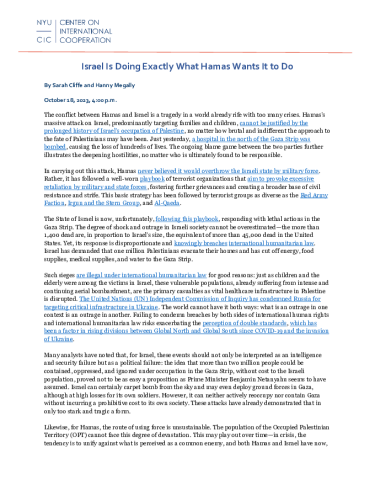The conflict between Hamas and Israel is a tragedy in a world already rife with too many crises. Hamas’s massive attack on Israel, predominantly targeting families and children, cannot be justified by the prolonged history of Israel’s occupation of Palestine, no matter how brutal and indifferent the approach to the fate of Palestinians may have been. Just yesterday, a hospital in the north of the Gaza Strip was bombed, causing the loss of hundreds of lives. The ongoing blame game between the two parties further illustrates the deepening hostilities, no matter who is ultimately found to be responsible.
In carrying out this attack, Hamas never believed it would overthrow the Israeli state by military force. Rather, it has followed a well-worn playbook of terrorist organizations that aim to provoke excessive retaliation by military and state forces, fostering further grievances and creating a broader base of civil resistance and strife. This basic strategy has been followed by terrorist groups as diverse as the Red Army Faction, Irgun and the Stern Group, and Al-Qaeda.
The State of Israel is now, unfortunately, following this playbook, responding with lethal actions in the Gaza Strip. The degree of shock and outrage in Israeli society cannot be overestimated—the more than 1,400 dead are, in proportion to Israel’s size, the equivalent of more than 45,000 dead in the United States. Yet, its response is disproportionate and knowingly breaches international humanitarian law. Israel has demanded that one million Palestinians evacuate their homes and has cut off energy, food supplies, medical supplies, and water to the Gaza Strip.
In this piece, Sarah Cliffe and Hanny Megally discuss what should the international community do to prevent an irreversible downward spiral in both societies, in the conflict between them, and in the spillover to the rest of the world?
